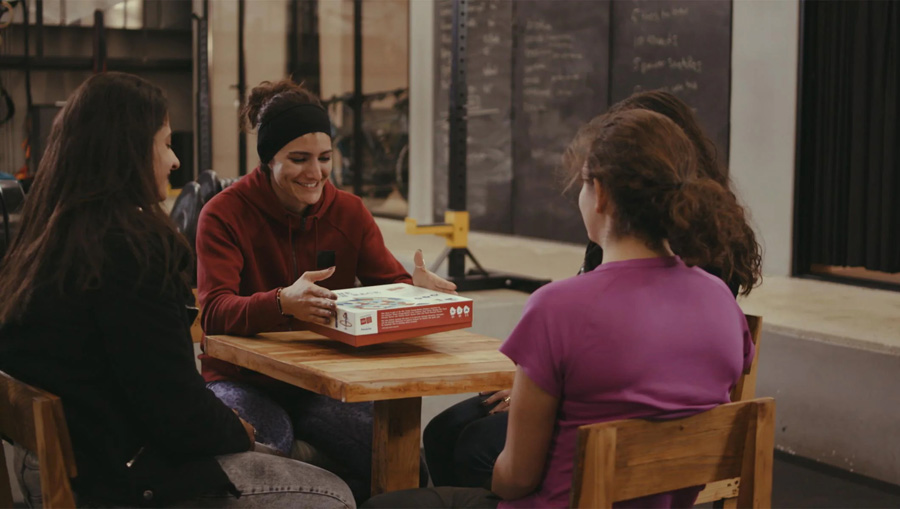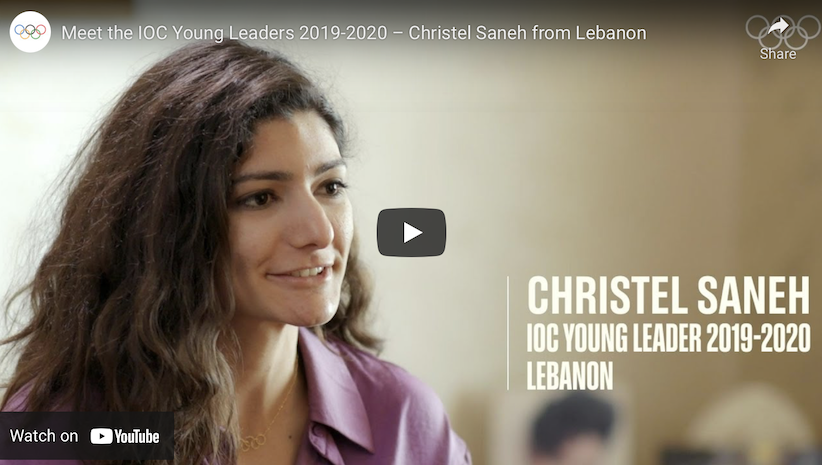IOC Young Leader Christel Saneh aiming for gender balanced portrayal of athletes in the media

22 Mar 2022 – As the International Olympic Committee continues to celebrate gender equality throughout March, we speak to Lebanese long jumper and IOC Young Leader Christel Saneh, who is aiming to use her skills as a journalist, photographer and illustrator to better portray female athletes in the media.
Christel Saneh clearly remembers the moment she first tried the standing long jump. Taking part in her PE lesson at school in Dik El Mehdi – a town to the north of Beirut – she leapt 1.90m on her first attempt as a seven-year-old. This prompted her teacher, who just happened to be Arda Kalpaklian, the first Lebanese woman to participate at the Olympic Games in athletics in munich 1972, to immediately march her to the basketball court – the sport being the main focus of the school. A few shooting attempts later, Saneh was promptly added to the school’s basketball team without hesitation. At face value, taking a natural long jumper away from the sport and pushing them into basketball may not completely add up, but Saneh understood early on what they had in mind.
“I knew why she did that,” explains Saneh. “She believed that athletics shouldn’t start at a very young age. And, somehow, she knew that I would find my way back to it through basketball eventually.


Having participated in a host of different sports, including basketball and indoor futsal, the teacher was proven right as Saneh moved back into athletics, where she competed in both sprint events and the long jump. It became clear to her, however, that her true talent lay in the latter.
“I broke five metres in the long jump when I was only 12 years old, so I decided to focus only on athletics,” she says. “Admittedly, I was also secretly still going to play basketball with the team without my coach knowing.”
While the lure of basketball proved too hard to resist, even to the talented long jumper, Saneh soon discovered that there was not a similar interest in the athletics events she was competing in. As she progressed through the age groups, this trend continued and the lack of attention or news coverage her sport and the other female competitors were receiving became something that she could no longer stand for. Rather than accept the situation as it was, Saneh decided to do something about it.
“When I was 16, I started covering my own sport because no one was doing it,” she explains. “And still now, 10 years later, no one’s doing it. If I’m not on the ground, no one is covering it. This was my ticket to the IOC Young Reporters programme. I was 19 and they saw this female athlete from the Middle East was doing something, so they decided to pick me to take part. This was a real door opening moment for me and it led to so many different opportunities later, like the IOC Young Leaders programme”.
Seeing the Games through a new lens
Saneh’s work with the IOC Young Reporters programme proved invaluable to her, not just in terms of opening doors to new opportunities, but also in terms of giving her a clarity of thought with regards to what to do with her life outside of sport.
Having participated in and excelled at the long jump throughout her youth, she harboured dreams of reaching the Olympic Games. But despite being the Lebanese national record holder in the long jump, she was unable to realise her dream as an athlete. Instead, she fulfilled her Olympic ambition as a journalist – first as part of the IOC Young Reporters programme at the Youth Olympic Games Nanjing 2014, and then subsequently in Rio, Buenos Aires, Lausanne and Tokyo.
While speaking to a colleague about her disappointment at not being able to fulfil her dream in the long jump, she realised that whether she was there as an athlete or a journalist, she was still there and would still have a wonderful Olympic experience. This thought stayed with Saneh, who saw the same Olympic values the athletes express reflected in the journalists and others involved in the Games.
Another key issue she bore witness to at the Olympic Games was the power of the media. She saw the same ideas about gender and sport reinforced time and again, whether in articles or in photographs. Indeed, she believes that it is not just a case of including someone in a photograph or not. There can be so much insinuated through the different photographic techniques in terms of framing, focus and so on, that it can affect the reader’s opinion on the subject.
“You can learn about the different cultures from movies or pictures that you see; it’s the same with covering sports,” says Saneh. “All the technical aspects of photography, for example, play a huge role in how the viewer receives the image. Fundamentally, when the media covers something, it exists. If they don’t, it doesn’t – as simple as that. So, if you don’t cover women who are winning, no one is going to know that these women are winning. That’s when I realised that media can be a weapon and we need to use it to make a difference.”
This use of the media to properly portray female athletes can be seen in Saneh’s own personal work. When she went to Rio 2016 to cover the Olympic Games, she decided to produce a comic book that would focus on Arab women who are perhaps not given the attention they deserve both because of their gender and their background. As such, she spoke to Ray Bassil, the only Olympic level female shooter in Lebanon, Sarah Attar, who was one of the first two female Olympians representing Saudi Arabia at an Olympic Games, and Nawal El Moutawakel, who famously became the first Arab, African and Muslim woman to win a gold medal at the Olympic Games, claiming first place in the 400m hurdles at Los Angeles 1984 and paving the way for many others to follow in doing so.
“I decided to do a comic book about their journeys and that was linked to me being a reporter covering their stories. Now I’m also doing another master’s degree in multimedia journalism. And I’m also doing research about how Arab women are visually portrayed at the Olympics Games.”
Spreading the Olympic values through play
These moves to ensure that sport is used as a power for good and that women are proportionally and properly represented in the media have been further supported by a project Saneh developed as part of the IOC Young Leader programme.
“For this programme, I decided to create a board game with another IOC Young Leader from Lebanon, Tony Tarraf. ‘The Torch Race’ is a game based on the Olympic Torch Relay that is full of trivia questions about the Games, and challenges from other players. Each player is a torchbearer who has to reach the end of the race to light the Cauldron. Crucially, there is a strong focus promoting the Olympic values, Olympism and the Olympic Movement through play, which I believe are inextricably linked to gender equity. We thought it would be a good idea to attract young athletes’ attention through a game, so they would play and learn at the same time. It’s been out for two years already now, and we’ve distributed it to local gyms, to podium finishers in competitions and so on.”
Having learnt so much from participating in the Young Leaders initiative, using a tangible tool such as ‘The Torch Race’ to help her community and spread the positive messages to be learnt from the Olympic values is important to Saneh, who believes that acquiring knowledge and then not passing it onto others is a wasted opportunity.
“This programme helped me so much,” she explains. “It’s a multicultural programme, so I was able to meet wonderful people from around the world who are trying to make a difference in their communities, and I am still in contact with them today. It’s a brilliant idea to take what you learned from all the seminars or the Olympics and then to bring it back to your community. For me, attending seminars and being a part of this but then not doing anything for your community is useless. Giving back is like the best thing you can do. And this programme allows us to really give back to our local community.”
While Saneh’s dreams of competing at the Olympic Games as an athlete may not have come true, her actions as a role model spreading the Olympic values may have just as much of an impact.
Learn more about the IOC Young Leaders Programme here and follow us on:
Instagram: @iocyoungleaders
Facebook: IOC Young Leaders
LinkedIn: IOC Young Leaders Community of Practice





